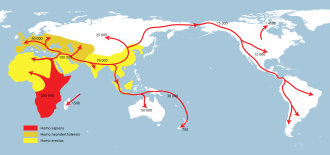Americas
Landmass comprising North and South America

The Americas comprise the totality of the continents of North America and South America. Together, they make up most of the land in Earth's Western Hemisphere and comprise the New World.
Etymology and Naming[edit]
The name "Americas" is derived from the name of the Italian explorer Amerigo Vespucci. Vespucci was among the first European explorers to suggest that the lands discovered by Christopher Columbus in 1492 were part of a new continent, separate from Asia. The name "America" first appeared on a map in 1507.

Geography[edit]
The Americas are divided into two continents: North America and South America. These continents are connected by the narrow Isthmus of Panama.
North America[edit]
North America is the third largest continent by area, following Asia and Africa. It is bordered by the Arctic Ocean to the north, the Atlantic Ocean to the east, the Pacific Ocean to the west, and South America and the Caribbean Sea to the southeast.
South America[edit]
South America is the fourth largest continent by area. It is bordered by the Caribbean Sea to the northwest, the Atlantic Ocean to the northeast and east, and the Pacific Ocean to the west.

History[edit]
Pre-Columbian Era[edit]
The Americas were first populated by humans during the Paleolithic era, when people migrated from Asia across the Bering Land Bridge. These early inhabitants developed diverse cultures and civilizations, including the Inca Empire, Aztec Empire, and the Maya civilization.

European Exploration and Colonization[edit]
The arrival of Christopher Columbus in 1492 marked the beginning of European exploration and colonization of the Americas. This period saw the establishment of European colonies and the significant impact on indigenous populations.

Independence Movements[edit]
The 18th and 19th centuries were marked by independence movements across the Americas, leading to the formation of new nations. The United States declared independence from Great Britain in 1776, followed by many Latin American countries in the early 19th century.

Culture[edit]
The Americas are home to a rich tapestry of cultures, languages, and traditions. The cultural landscape is shaped by the indigenous peoples, European colonizers, African slaves, and later immigrants from around the world.
Economy[edit]
The economies of the Americas are diverse, ranging from the highly developed and industrialized economy of the United States to the developing economies of many Latin American countries. The region is rich in natural resources, including oil, minerals, and agricultural products.
Environment[edit]
The Americas encompass a wide range of climates and ecosystems, from the Arctic tundra of northern Canada to the tropical rainforests of the Amazon Basin. This diversity supports a vast array of plant and animal life.

Related Pages[edit]
Ad. Transform your life with W8MD's Budget GLP-1 injections from $75


W8MD offers a medical weight loss program to lose weight in Philadelphia. Our physician-supervised medical weight loss provides:
- Weight loss injections in NYC (generic and brand names):
- Zepbound / Mounjaro, Wegovy / Ozempic, Saxenda
- Most insurances accepted or discounted self-pay rates. We will obtain insurance prior authorizations if needed.
- Generic GLP1 weight loss injections from $75 for the starting dose.
- Also offer prescription weight loss medications including Phentermine, Qsymia, Diethylpropion, Contrave etc.
NYC weight loss doctor appointmentsNYC weight loss doctor appointments
Start your NYC weight loss journey today at our NYC medical weight loss and Philadelphia medical weight loss clinics.
- Call 718-946-5500 to lose weight in NYC or for medical weight loss in Philadelphia 215-676-2334.
- Tags:NYC medical weight loss, Philadelphia lose weight Zepbound NYC, Budget GLP1 weight loss injections, Wegovy Philadelphia, Wegovy NYC, Philadelphia medical weight loss, Brookly weight loss and Wegovy NYC
|
WikiMD's Wellness Encyclopedia |
| Let Food Be Thy Medicine Medicine Thy Food - Hippocrates |
Medical Disclaimer: WikiMD is not a substitute for professional medical advice. The information on WikiMD is provided as an information resource only, may be incorrect, outdated or misleading, and is not to be used or relied on for any diagnostic or treatment purposes. Please consult your health care provider before making any healthcare decisions or for guidance about a specific medical condition. WikiMD expressly disclaims responsibility, and shall have no liability, for any damages, loss, injury, or liability whatsoever suffered as a result of your reliance on the information contained in this site. By visiting this site you agree to the foregoing terms and conditions, which may from time to time be changed or supplemented by WikiMD. If you do not agree to the foregoing terms and conditions, you should not enter or use this site. See full disclaimer.
Credits:Most images are courtesy of Wikimedia commons, and templates, categories Wikipedia, licensed under CC BY SA or similar.
Translate this page: - East Asian
中文,
日本,
한국어,
South Asian
हिन्दी,
தமிழ்,
తెలుగు,
Urdu,
ಕನ್ನಡ,
Southeast Asian
Indonesian,
Vietnamese,
Thai,
မြန်မာဘာသာ,
বাংলা
European
español,
Deutsch,
français,
Greek,
português do Brasil,
polski,
română,
русский,
Nederlands,
norsk,
svenska,
suomi,
Italian
Middle Eastern & African
عربى,
Turkish,
Persian,
Hebrew,
Afrikaans,
isiZulu,
Kiswahili,
Other
Bulgarian,
Hungarian,
Czech,
Swedish,
മലയാളം,
मराठी,
ਪੰਜਾਬੀ,
ગુજરાતી,
Portuguese,
Ukrainian